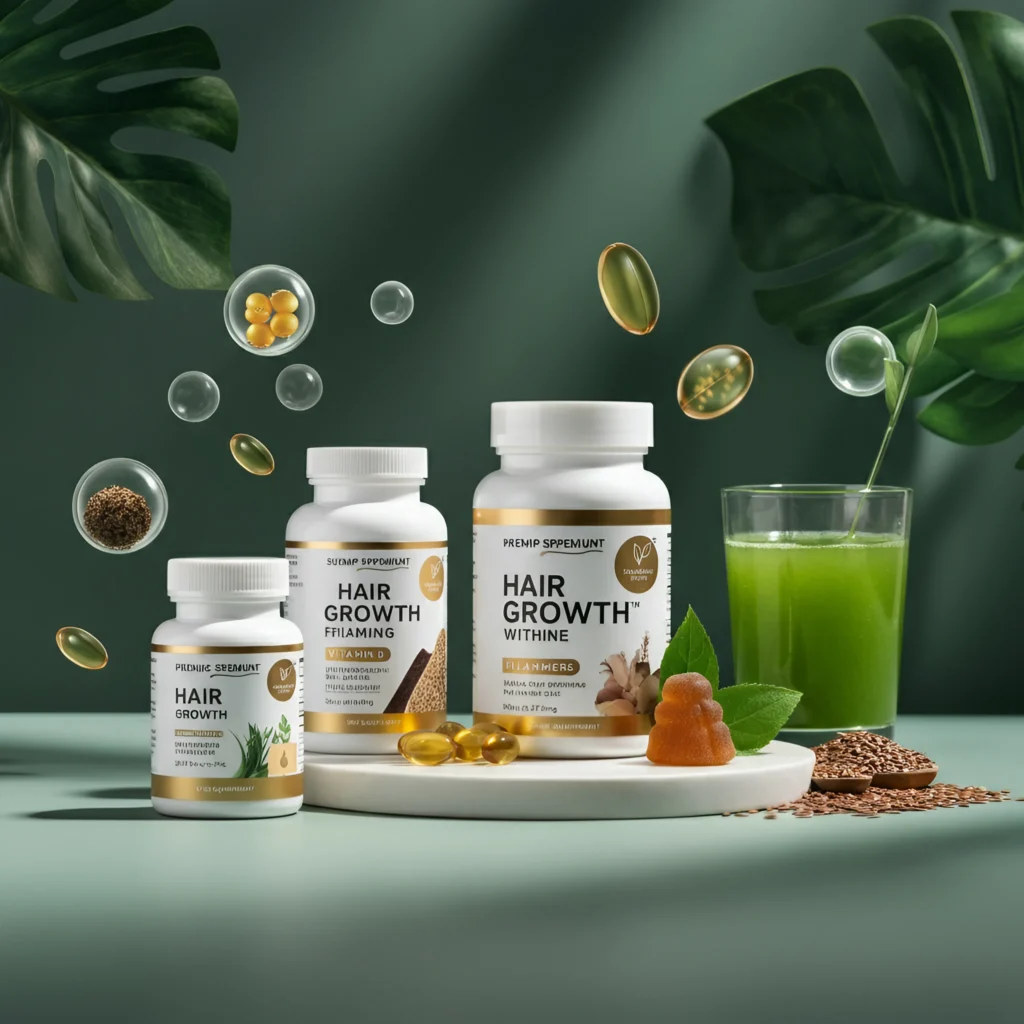
Hair is often called our “crowning glory,” playing a vital role in self-expression, confidence, and cultural identity. For many, maintaining lush, healthy hair is more than a beauty goal; it’s tied to self-esteem. But for the 85% of men and 33% of women who experience hair loss at some point in their lives, finding a reliable solution can be daunting. Enter hair supplements.
From social media buzz to glowing testimonials, these products claim to work wonders for hair growth, thickness, and shine. But the question persists: Do hair supplements really work? Let’s explore their science, effectiveness, and whether they’re the right choice for you.
Understanding Hair Growth
To understand how supplements might affect hair, it’s essential to grasp the basics of the hair growth cycle and what our hair is made of.
The Hair Growth Cycle
Hair growth follows a natural cycle with three phases:
- Anagen Phase (growth): Lasting 2–7 years, this is when your hair actively grows.
- Catagen Phase (transition): Over 2–3 weeks, the follicle shrinks, and growth slows.
- Telogen Phase (resting): Lasting 3–4 months, older hair is shed, and new strands prepare to grow.
Each hair follicle goes through this cycle independently, and most of us have 80–90% of our hair in the anagen phase at any given time.
Keratin’s Role in Hair
Hair strands are primarily made of keratin, a protein that gives them structure and strength. Keratin production is powered by nutrients like biotin, zinc, and amino acids, which is why these often feature prominently in hair supplements.
Common Causes of Hair Loss
Before jumping into supplements, it’s important to identify the root cause of hair loss. Factors include:
- Genetics: Conditions like androgenetic alopecia (pattern baldness) are hereditary.
- Hormonal Changes: Pregnancy, menopause, and thyroid issues can disrupt hair growth.
- Aging: Hair naturally thins as we age.
- Stress and Illness: Physical or emotional stress, as well as conditions like alopecia areata, can trigger hair loss.
- Medication Side Effects: Certain drugs can impact hair health.
- Nutritional Deficiencies: Low levels of iron, zinc, vitamin D, or protein can weaken hair.
Knowing the cause is key to finding the most effective solution.
Key Nutrients for Hair Health
If nutritional gaps are contributing to hair loss, specific nutrients come into play. Here are the heavy hitters in most hair supplements and what they do for your hair:
1. Biotin (Vitamin B7)
- What it does: Supports keratin production, strengthening hair.
- Proven benefits: Studies show biotin improves hair thickness in individuals with deficiencies.
- Sources: Found in eggs, nuts, and fortified foods.
2. Vitamin D
- What it does: Encourages hair follicle cycling.
- Proven benefits: Deficiency is linked to hair thinning, and supplementing can aid regrowth.
- Sources: Sunlight, fatty fish, and fortified milk.
3. Zinc
- What it does: Supports cell growth and repair.
- Proven benefits: Zinc deficiency may cause shedding; supplementation restores balance.
- Sources: Oysters, pumpkin seeds, and lentils.
4. Iron
- What it does: Delivers oxygen to hair follicles.
- Proven benefits: Iron-deficient individuals may see drastic improvement with supplements.
- Sources: Spinach, red meat, and legumes.
5. Collagen
- What it does: Provides amino acids that strengthen hair.
- Proven benefits: Collagen supplements improve brittleness and elasticity.
- Sources: Marine or bovine collagen powders.
6. Omega-3 Fatty Acids
- What it does: Hydrates the scalp and promotes a healthy growth cycle.
- Proven benefits: Omega-3 supplements reduce breakage and improve density.
- Sources: Fish oil, walnuts, and flaxseeds.
Do Hair Supplements Really Work?
The effectiveness of hair supplements depends largely on the cause of hair health issues:
- For Deficiencies: Evidence supports that supplements can address nutritional gaps, leading to improved growth and reduced shedding.
- For Non-Deficiency Causes: If hair loss stems from genetics, hormones, or medical conditions, supplements alone may not suffice.
Research Highlights
- A study in the Journal of Dermatology found that biotin supplementation over six months improved hair thickness for participants with deficiencies.
- Another study in the International Journal of Trichology revealed a combination of vitamins and minerals, including zinc and vitamin D, reduced shedding significantly after consistent use.
The Catch
Most supplements take at least 3–6 months to show visible results. Additionally, they work best when paired with a balanced diet and proper hair care.
Benefits and Risks of Hair Supplements
Benefits
- Fill Nutritional Gaps: Address deficiencies that impact hair growth.
- Improve Hair Quality: Strengthen and add shine.
- Convenience: Easy way to incorporate key nutrients into your regimen.
Risks
- Over-Supplementation: Excesses of vitamins like A, D, and E can be toxic, leading to further hair loss.
- Unregulated Market: Supplements are not FDA-approved, so quality varies widely.
- False Expectations: Supplements won’t reverse balding or replace medical treatments.
Popular Hair Supplement Brands
If you’re considering supplements, here are some trusted options:
- Viviscal: Features a marine complex clinically tested for hair growth.
- Nutrafol: Blends biotin, ashwagandha, and zinc for hair wellness.
- SugarBearHair: Instagram-famous gummies with biotin and vitamins.
- Hairfinity: Combines amino acids, zinc, and vitamins for strength and growth.
Expert Recommendations
Doctors emphasize caution before starting any supplement regimen:
- Get Tested: Blood tests for nutrient levels can pinpoint deficiencies.
- Consult Professionals: A dermatologist or trichologist can guide you better than generic ads.
- Check for Interactions: Ensure the supplements are safe alongside any medications you take.
Beyond Supplements
While hair supplements provide support, they’re just one piece of the puzzle. Explore these additional solutions:
- FDA-Approved Options: Treatments like finasteride and minoxidil have a proven track record for addressing hair loss.
- Lifestyle Changes: Manage stress, practice gentle hair care, and eat a nutrient-rich diet to optimize results.
What You Need to Know Before You Buy
Beware of common myths:
- “They work overnight.” Truth: Consistency is key, and results take months.
- “All supplements are the same.” Truth: Quality and ingredients vary widely.
- “They work for everyone.” Truth: Effectiveness depends on individual factors.







